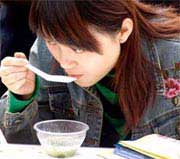 Recyclable and disposable plastic tableware such as bowls, plates, and spoons may pose serious health risks, experts in China warn after discovering that half of these products are made from unsafe materials.
Recyclable and disposable plastic tableware such as bowls, plates, and spoons may pose serious health risks, experts in China warn after discovering that half of these products are made from unsafe materials.
The misuse of substances like talc powder and calcium carbonate in plastic recycling can produce carcinogenic chemicals when they come into contact with oils and hot food. The use of industrial paraffin wax in the manufacturing process also presents similar risks, asserts Mr. Dong Jinshi, Deputy Director of the Packaging Resources Committee of the China Packaging Association.
According to the inspection results from the General Administration of Quality Supervision, Inspection and Quarantine, many hazardous materials are widely used as substitutes for the safe polypropylene, which should constitute up to 80% of the components in quality products. The primary reason for this is that one ton of polypropylene costs $1,300, while one ton of alternative materials costs only $240. In nearly 100 factories in Tianjin, Shanghai, and the provinces of Henan and Liaoning, 60% of disposable plastic products are toxic.
Using recycled plastic products over an extended period can lead to chemicals like acetic acid leaching into food, affecting the digestive system and liver function, Dong indicated. The official also acknowledged that the root cause of this issue is the slow market supervision, light penalties, and lax cooperation among the related sectors.
China consumes approximately 6.5 billion disposable plastic items each year. At the end of last month, the country banned the use of plastic food wrapping paper containing the toxic substance DEHA nationwide. DEHA is a plasticizer used to soften PVC material.
Mỹ Linh (according to Xinhua)




















































